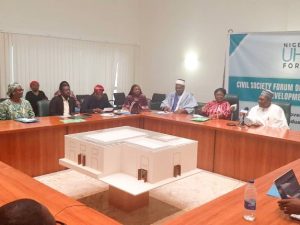On November 23, 2023, the Nigeria Universal Health Coverage (UHC) forum, in collaboration with dRPC organized a significant event, the Civil Society Forum on Nigeria’s Health Sector Development Blueprint with the Honourable Minister of Health, and Social Welfare Prof Mohammed Ali Pate CON.
This was the Honourable Minister’s first engagement following the recently concluded National Council on Health meeting held in Ekiti state. It was fitting that he decided to consult with civil society. The event provided a platform for civil society organizations to engage with the Honorable Minister of Health and Social Welfare as he discussed his ambitious health sector renewal program. The program addresses four critical areas: improved governance, population and health outcomes, unlocking the value chain, and health security.
The development Research and Projects Centre (dRPC) was honoured to participate in this forum, which brought together various stakeholders to discuss the future of Nigeria’s healthcare system. The forum provided a unique opportunity for civil society organizations, including dRPC, to contribute to the ongoing dialogue about the country’s health sector and provide valuable input into the government’s strategies and policies.

During the forum, Prof Mohammed Ali Pate passionately presented his health sector renewal program, outlining its key focus areas. He emphasized the importance of improved governance in the health sector, highlighting the need for transparency, accountability, and effective management to ensure the efficient delivery of healthcare services to all Nigerians. Additionally, he underscored the significance of addressing population and health outcomes, recognizing the need for targeted interventions to improve healthcare access and outcomes nationwide.
Furthermore, Prof Mohammed Ali Pate highlighted the importance of unlocking the value chain in the health sector, aiming to enhance efficiency and effectiveness in delivering healthcare services. He also emphasized the critical need for health security, particularly considering emerging global health threats and the ongoing challenges posed by infectious diseases.
One of the most noteworthy aspects of the forum was the minister’s call to civil society organizations to appraise his blueprint, identify its strengths and weaknesses, and provide recommendations to improve the proposed strategies further. This call to action demonstrated the minister’s commitment to engaging with civil society and incorporating diverse perspectives into the development of the health sector renewal program.
As a participant in the forum, dRPC actively engaged in discussions and contributed valuable insights to the appraisal of the Blueprint. The organization leveraged its expertise and experience in health research and policy advocacy to critically analyze the proposed strategies, identify potential areas for improvement, and offer constructive recommendations to enhance the effectiveness and impact of the health sector renewal program. Moving forward, dRPC remains committed to collaborating with the government, civil society, and other stakeholders to support the ongoing efforts to strengthen Nigeria’s healthcare system. The organization is dedicated to advocating for evidence-based policies, inclusive governance, and sustainable solutions that will contribute to achieving universal health coverage and improved health outcomes for all Nigerians.
In conclusion, the Civil Society Forum on Nigeria’s Health Sector Development Blueprint provided a valuable platform for dialogue and collaboration, fostering constructive engagement between the government and civil society organizations. The active participation of dRPC and other stakeholders underscored the importance of inclusive decision-making and the collective effort required to drive meaningful change in Nigeria’s health sector. As the dialogue continues, all stakeholders must remain committed to working together to address the challenges and opportunities in the pursuit of a healthier and more resilient future for Nigeria.
The event concluded with a sense of optimism. It renewed its commitment to advancing the goals of the health sector renewal program, with the shared understanding that sustained collaboration. Inclusive participation will be essential in shaping the future of healthcare in Nigeria.

